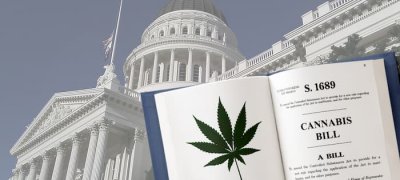The first marijuana reform bill of the new Congress was introduced this week. It’s not the comprehensive legalization legislation that advocates are waiting for, but it would reschedule cannabis under federal law.
Text of the legislation, which has not yet been posted on Congress’s website but was shared with Marijuana Moment, states that “the Attorney General of the United States shall, by order not later than 60 days after the date of enactment of this section, transfer marijuana…from schedule I of such Act to schedule III of such Act.”
When the congressman introduced the bill in 2019, he said the state-level legalization movement necessitated a policy change that would free up research into cannabis.
“As marijuana is legalized for medical and recreational use across the United States, it is important that we study the effects of the substance and the potential impacts it can have on various populations,” he said at the time. “By rescheduling marijuana from a schedule I controlled substance to a schedule III controlled substance, the opportunities for research and study are drastically expanded.”
A bill to accomplish that cleared the U.S. House of Representatives last year, but it died in the GOP-controlled Senate. Now that Democrats have control of both chambers, activists are waiting for the legislation to be taken back up with a better chance of making it to Biden’s desk.
That bill—the Marijuana Opportunity, Reinvestment and Expungement (MORE) Act—was sponsored by now-Vice President Kamala Harris, though she’s indicated that she would not necessarily push the president to adopt a pro-legalization position.
While moving marijuana to Schedule III under Steube’s new bill would not end federal prohibition in the way the MORE Act would, it would still have a number of effects.
It would, for example, protect federal employees who use marijuana from a Reagan-era executive order that defines illegal drugs as Schedule I or II substances.
And only drugs under Schedules I and II are affected by the tax provision known as “280E” that blocks cannabis companies from deducting businesses expenses from their taxes.
Reclassification would also make scientific research easier, since cannabis’s current Schedule I status creates additional hurdles for studies.
Moving cannabis out of Schedule I would additionally end threats from the U.S. Postal Service that publishers have faced over the mailing of newspapers containing marijuana advertisements, since the federal statute the agency has cited to justify its actions applies only to Schedule I substances.
But modest rescheduling alone would not remove federal criminal penalties. Advocates have also expressed concerns that any move other than a complete removal from the CSA could create additional regulatory roadblocks for cannabis businesses that are operating in compliance with state laws.
Marijuana in congress
Rep. Greg Steube (R-FL) filed the proposal, which is identical to a measure he sponsored last session. It would simply move marijuana from Schedule I to Schedule III of the Controlled Substances Act (CSA).Text of the legislation, which has not yet been posted on Congress’s website but was shared with Marijuana Moment, states that “the Attorney General of the United States shall, by order not later than 60 days after the date of enactment of this section, transfer marijuana…from schedule I of such Act to schedule III of such Act.”
When the congressman introduced the bill in 2019, he said the state-level legalization movement necessitated a policy change that would free up research into cannabis.
“As marijuana is legalized for medical and recreational use across the United States, it is important that we study the effects of the substance and the potential impacts it can have on various populations,” he said at the time. “By rescheduling marijuana from a schedule I controlled substance to a schedule III controlled substance, the opportunities for research and study are drastically expanded.”
Will Biden legalize marijuana?
But while rescheduling is backed by President Joe Biden, who remains opposed to adult-use legalization, it’s not the reform that advocates are getting behind. There are high hopes that a more comprehensive completely remove marijuana from the CSA—while promoting social equity—will move through the 117th Congress.A bill to accomplish that cleared the U.S. House of Representatives last year, but it died in the GOP-controlled Senate. Now that Democrats have control of both chambers, activists are waiting for the legislation to be taken back up with a better chance of making it to Biden’s desk.
That bill—the Marijuana Opportunity, Reinvestment and Expungement (MORE) Act—was sponsored by now-Vice President Kamala Harris, though she’s indicated that she would not necessarily push the president to adopt a pro-legalization position.
While moving marijuana to Schedule III under Steube’s new bill would not end federal prohibition in the way the MORE Act would, it would still have a number of effects.
It would, for example, protect federal employees who use marijuana from a Reagan-era executive order that defines illegal drugs as Schedule I or II substances.
And only drugs under Schedules I and II are affected by the tax provision known as “280E” that blocks cannabis companies from deducting businesses expenses from their taxes.
Reclassification would also make scientific research easier, since cannabis’s current Schedule I status creates additional hurdles for studies.
Moving cannabis out of Schedule I would additionally end threats from the U.S. Postal Service that publishers have faced over the mailing of newspapers containing marijuana advertisements, since the federal statute the agency has cited to justify its actions applies only to Schedule I substances.
But modest rescheduling alone would not remove federal criminal penalties. Advocates have also expressed concerns that any move other than a complete removal from the CSA could create additional regulatory roadblocks for cannabis businesses that are operating in compliance with state laws.




